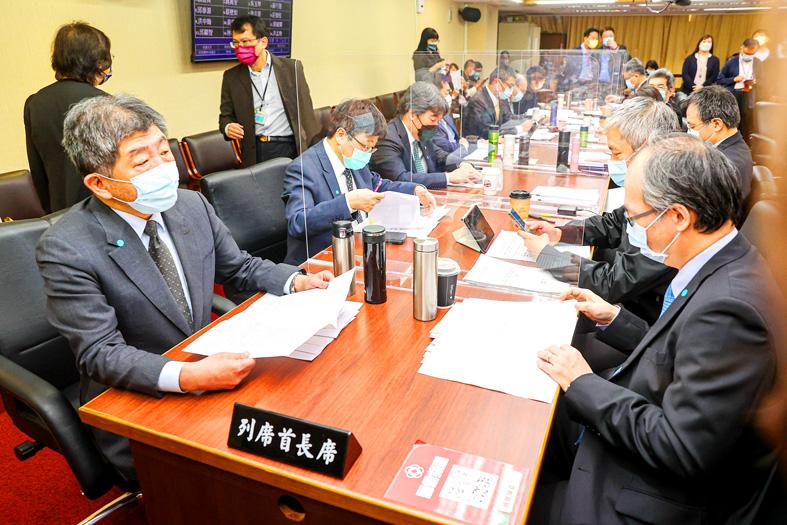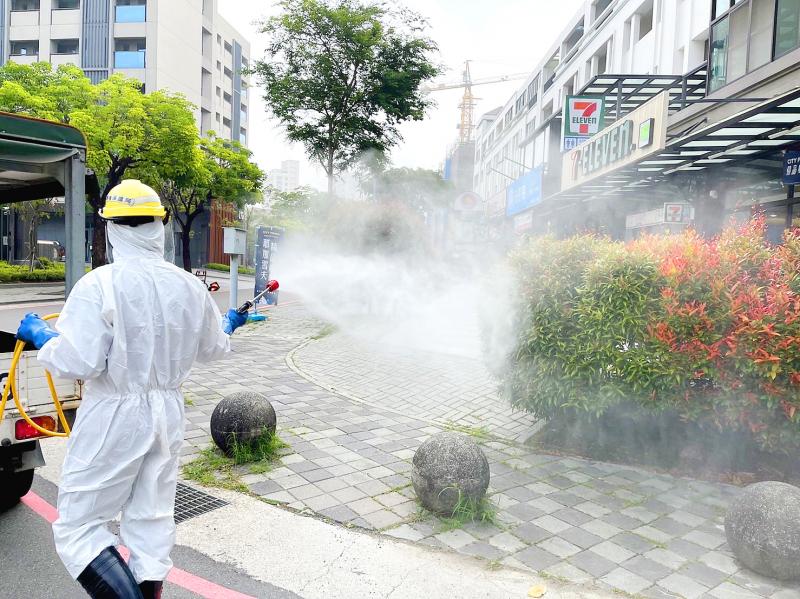The Ministry of Health and Welfare yesterday launched a new pandemic response strategy to mark the government’s departure from a “zero COVID-19” policy.
The revised strategy — billed as the “new Taiwanese model” and authorized by Premier Su Tseng-chang (蘇貞昌) at a meeting earlier in the day — would no longer focus on total suppression, Centers for Disease Control Deputy Director-General Chuang Jen-hsiang (莊人祥) told a news conference in Taipei.
The shift in priorities was prompted by the nature of the Omicron variant of SARS-CoV-2, which produces milder to no symptoms in infected people, to mitigate health risks to communities, reduce the burden on the medical system and maintain a normal life, Chuang cited Su as saying.

Photo: CNA
Only five people who have contracted COVID-19 this year developed moderate or severe symptoms, while 99.7 percent reported mild or no symptoms, Su said.
This means that health officials can shift gears to mitigating the effects of the pandemic, but the new model is not the same as “living with COVID-19,” as the virus would not be allowed to spread unchecked, Su said.
The strategy is to be implemented under the principle of allowing people to live normal lives, active prevention of the virus’ spread and a stable reopening of the economy, striking a balance between maintaining public health and economic well-being, he added.

Photo courtesy of the Tainan City Government
More incentives should also be offered to encourage people to take a third COVID-19 jab, he said, adding that the public’s ability to remain vigilant and take necessary measures to protect their health is a key part of the new model.
Meanwhile, the Central Epidemic Command Center (CECC) yesterday reported 531 new cases of COVID-19 — 382 domestically transmitted and 149 imported.
The local case count exceeded 100 for the seventh consecutive day and was the highest daily number this year, breaking the previous high of 281 recorded on Wednesday.
New Taipei City had the most cases at 111, followed by Taipei with 87 and Kaohsiung with 59, the CECC said.
Of the 149 imported cases, 78 were travelers who tested positive on arrival, it said.
Minister of Health and Welfare Chen Shih-chung (陳時中) announced plans to procure additional supplies of the antiviral COVID-19 drug Paxlovid from Pfizer.
While Paxlovid is hard to get hold of, the government plans to procure at least 100,000 more courses, Chen told a legislative committee meeting, adding that negotiations with Pfizer were ongoing.
Earlier this year, Taiwan signed a deal with Pfizer to procure 20,000 courses of Paxlovid, with the first batch — 3,200 courses — arriving on Jan. 27, Chen said, adding that about 15,000 courses have yet to be delivered.
Taiwan has ordered a combined total of 25,000 courses of Paxlovid and Molnupiravir from drugmaker Merck, he added.
The CECC is to hold discussions next week on guidelines for people with light symptoms to quarantine at home, Chen said.
There are several issues that need to be addressed before such a policy can be implemented, he said, citing as an example how patients can receive appropriate care during home quarantine.
Although Taiwan has a smart healthcare platform in place, providing remote health services on a large scale is an issue, he said.

The Central Election Commission has amended election and recall regulations to require elected office candidates to provide proof that they have no Chinese citizenship, a Cabinet report said. The commission on Oct. 29 last year revised the Measures for the Permission of Family-based Residence, Long-term Residence and Settlement of People from the Mainland Area in the Taiwan Area (大陸地區人民在台灣地區依親居留長期居留或定居許可辦法), the Executive Yuan said in a report it submitted to the legislature for review. The revision requires Chinese citizens applying for permanent residency to submit notarial documents showing that they have lost their Chinese household record and have renounced — or have never

A magnitude 5.6 earthquake struck off the coast of Yilan County at 12:37pm today, with clear shaking felt across much of northern Taiwan. There were no immediate reports of damage. The epicenter of the quake was 16.9km east-southeast of Yilan County Hall offshore at a depth of 66.8km, Central Weather Administration (CWA) data showed. The maximum intensity registered at a 4 in Yilan County’s Nanao Township (南澳) on Taiwan’s seven-tier scale. Other parts of Yilan, as well as certain areas of Hualien County, Taipei, New Taipei City, Taoyuan, Hsinchu County, Taichung and Miaoli County, recorded intensities of 3. Residents of Yilan County and Taipei received

Taiwan has secured another breakthrough in fruit exports, with jujubes, dragon fruit and lychees approved for shipment to the EU, the Ministry of Agriculture said yesterday. The Animal and Plant Health Inspection Agency on Thursday received formal notification of the approval from the EU, the ministry said, adding that the decision was expected to expand Taiwanese fruit producers’ access to high-end European markets. Taiwan exported 126 tonnes of lychees last year, valued at US$1.48 million, with Japan accounting for 102 tonnes. Other export destinations included New Zealand, Hong Kong, the US and Australia, ministry data showed. Jujube exports totaled 103 tonnes, valued at

BIG SPENDERS: Foreign investors bought the most Taiwan equities since 2005, signaling confidence that an AI boom would continue to benefit chipmakers Taiwan Semiconductor Manufacturing Co’s (TSMC, 台積電) market capitalization swelled to US$2 trillion for the first time following a 4.25 percent rally in its American depositary receipts (ADR) overnight, putting the world’s biggest contract chipmaker sixth on the list of the world’s biggest companies by market capitalization, just behind Amazon.com Inc. The site CompaniesMarketcap.com ranked TSMC ahead of Saudi Aramco and Meta Platforms Inc. The Taiwanese company’s ADRs on Tuesday surged to US$385.75 on the New York Stock Exchange, as strong demand for artificial intelligence (AI) applications led to chip supply constraints and boost revenue growth to record-breaking levels. Each TSMC ADR represents